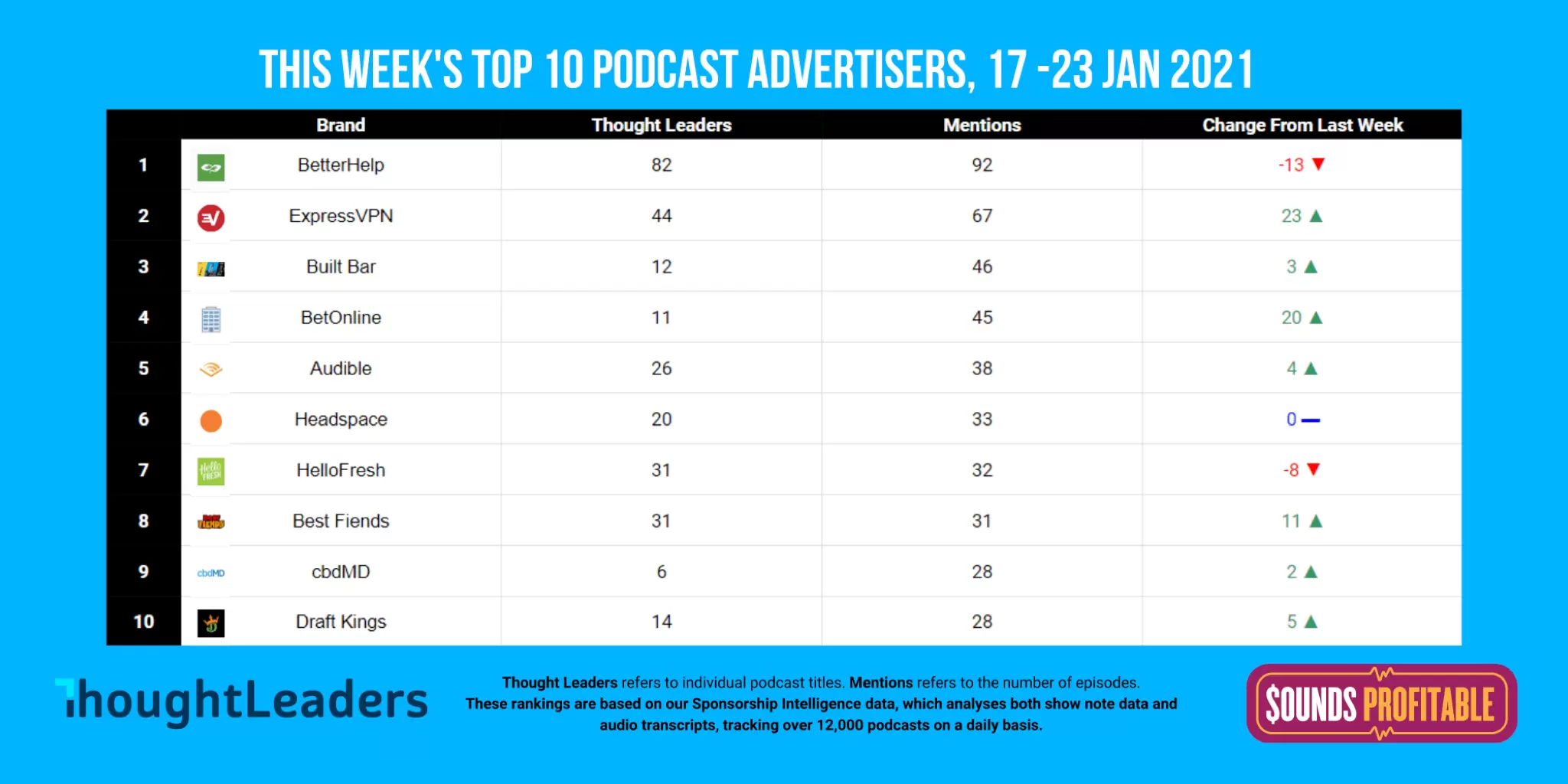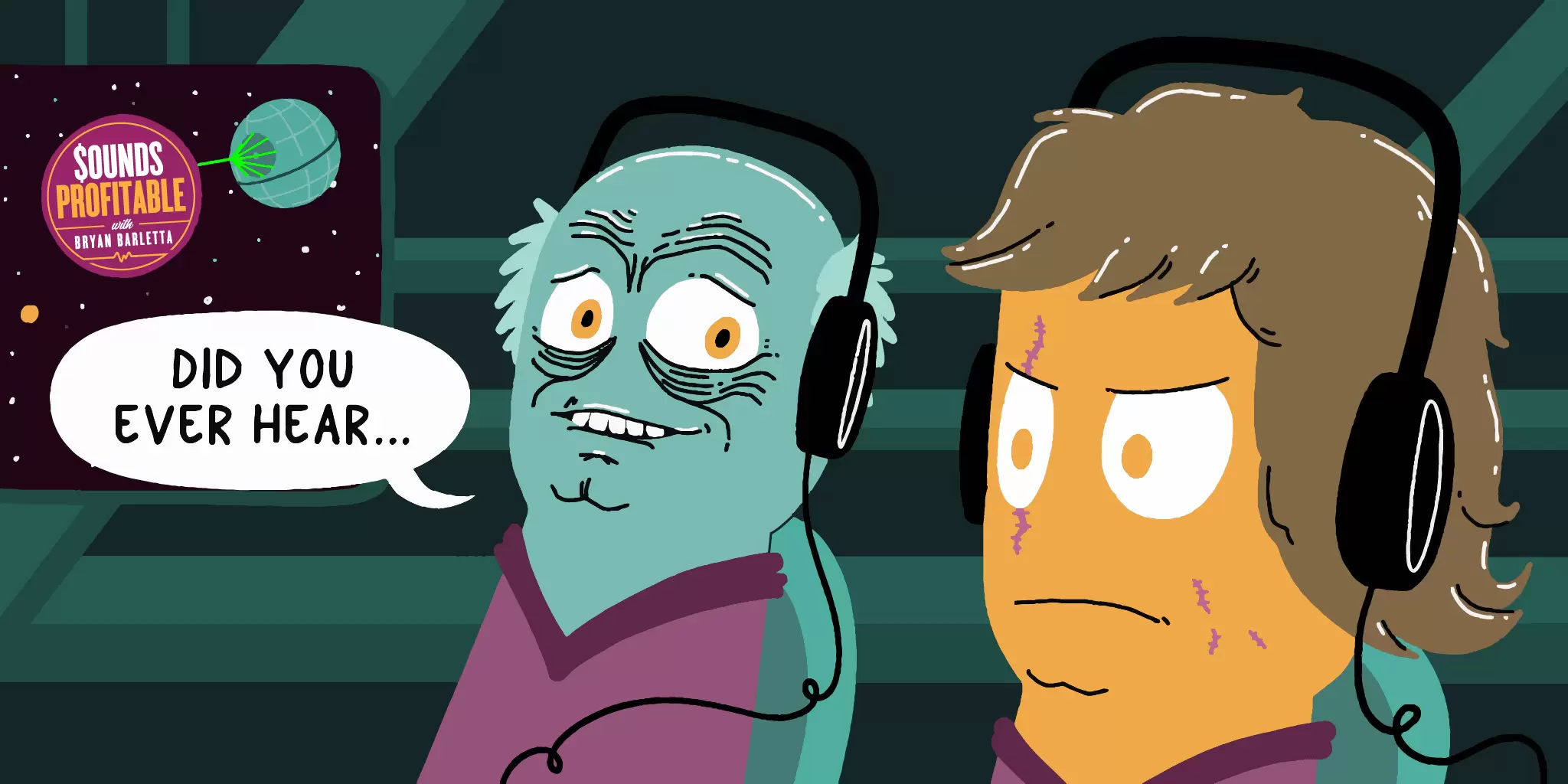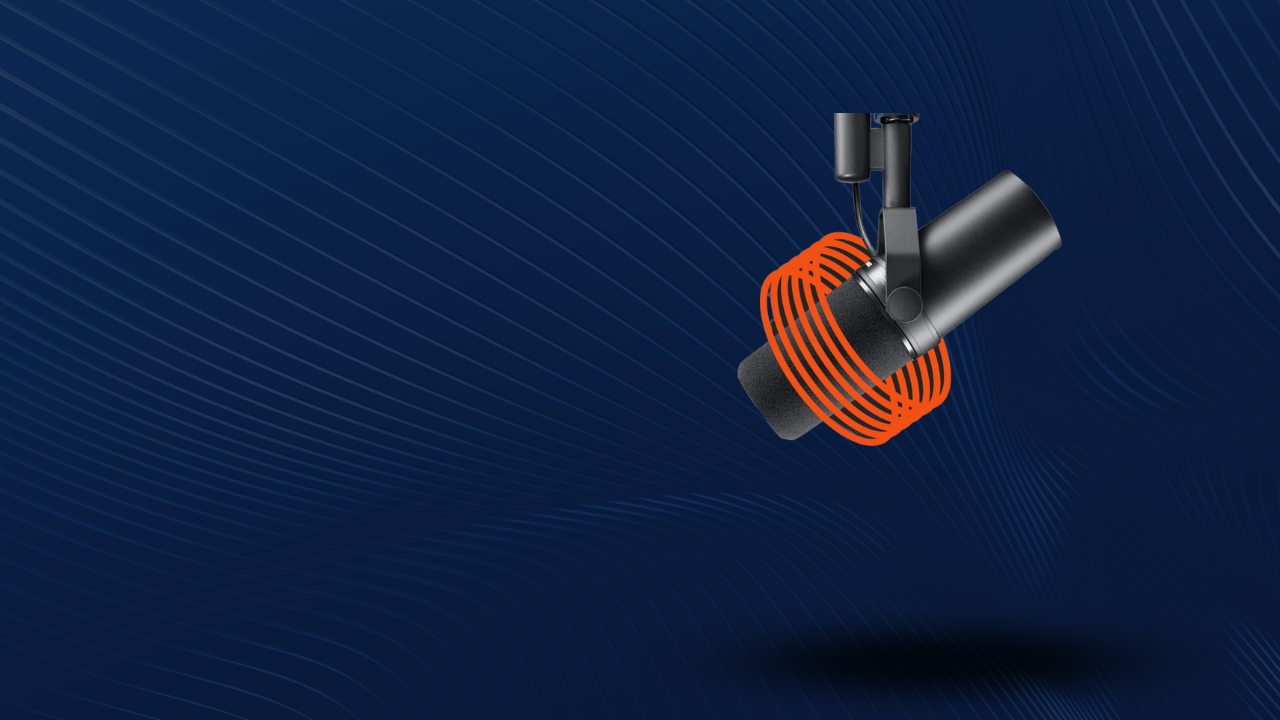Introduction
“Did you ever hear the tale of Jordan Harbinger the wise? I thought not. It’s not a story the advertising agencies would tell you. It’s a podcasting legend. Jordan Harbinger was a podcast host, so powerful and so wise he could buy host read ads to attract subscribers. He had such a knowledge of podcast advertising that he could even keep the subscribers he cared about from unsubscribing.” – Emperor Sheev Palpatine
While Jordan Harbinger is not a Sith Lord, he does have a very unique skill: he’s successfully able to buy host read ads at scale. On top of recording and releasing three new episodes of The Jordan Harbinger Show every single week (over 150 episodes a year), Jordan personally manages his own marketing budget of nearly $40,000 per month dedicated almost entirely to buying host read advertising. For every $1 invested, Jordan sees approximately $3 back in advertising revenue and an increase in downloads in the tens of thousands every month.
This week, we’re going to make a literal example out of Jordan that can be applied to all brands looking to buy host read ads at scale. Instead of telling you that it’s near impossible like every other advertising publication, we’re going to walk through the process and acknowledge where things get difficult. For brands, podcasters and agencies, this is the opportunity for you to learn about new tools, improve your understanding of the process, or identify where you can improve.
For the adtech companies, this a call to action. This industry needs to fix some of the glaring holes that make buying host read ads inaccessible for brands to try on their own.
Announcer Read & Listener Targeted Ads
Not every method of advertising is right for every campaign. But you won’t know which method is right until you test, learning what does and doesn’t work for your brand, your time, or your budget.
While the focus of this article is on buying host read ads at scale, it helps to first understand what led Jordan away from buying announcer read ads.
It may seem counterintuitive, but a show’s listener demographics rarely played a factor in the success of Jordan’s campaigns. There’s a lot of focus from the podcast adtech industry on listener demographic targeting, but Jordan found that it didn’t really move the needle, even when he was recording the ads himself.
Instead, Jordan looks for shows with active audiences. There are plenty of shows out there with great download numbers but lacking community cohesion. IAB verified downloads are not perfect and some podcast apps continue to download episodes to subscribed listeners who’ve stopped listening. If you’re tracking conversions for your campaign, which you absolutely should be, it’s easy to identify the shows that are not performing quickly and remove them from your plan, but the money has already been spent. For some brands with more money than time, this is a great approach, but that method didn’t appeal to him.
Initially, Jordan voiced the ads himself, on the logical assumption that his voice would be the best way to convey the value of his show, leaving nothing to chance. Only, that didn’t work. His voice was interrupting a podcast they chose to listen to, either based on targeting the content or targeting them directly, with zero credibility backing up why he mattered. Something was lost when he was suggesting his own show to people he never met, like a cold call sales email when what he really wanted was for an introduction from a mutual friend.
So Jordan switched to host read ads. His tests with announcer read ads didn’t meet the results he was looking for at the budget he was investing. It’s all about balancing priorities and knowing your brand. For Jordan, who is his own brand, the most appealing way to get granular and drive the success he wanted was to focus on host read ads.
But you’re not Jordan, so let me tell you what this means for you and how you can buy host read podcast ads yourself.
Finding Shows
A very muscular man once told me “you can’t sculpt a pebble.”
And while his advice was more focused on building an athletic physique, the adage still holds true. Before you can narrow down the list of shows you want to advertise on, you’ll need to create a large pool of shows to review.
Jordan’s method is built on the fact that he’s been a part of this industry for a while. He’s run campaigns with many of the methods listed below and he has strong relationships with other brands and podcasters directly. So for Jordan, how he creates his pool of shows is different than how someone brand new to buying at scale would create their pool.
For those of you looking to get started buying host-read ads at scale, here are a few ways I recommend going about it.
Publisher Representation Companies
Regardless of the size of a podcast, the more visibility a show gets, the more likely it’s going to have its inventory sold. Even for podcasts that also sell their inventory direct, there is a massive benefit of being part of a network like Midroll or AdLarge/Cabana, or working with a representation agency like True Native Media or Market Enginuity. The larger the network or rep agency, the more categories they cover, but there are many companies out there focusing on a specific niche. A great example is Lipstick & Vinyl, which focuses on “[…] on underrepresented and diverse voices. Right now, that means female voices.”. When working with one of these companies to buy ads, your contact is directly with them and they handle the relationship with the publishers.
Ad Marketplace Solutions
Think of this category as a technology and order management system focused take on the publisher representation model listed above. They facilitate the campaigns by providing tools they’ve built for discovery and then depending on the partner either act as the inbetween on your behalf or they allow you to connect directly with the publishers. This is a wide category with partners offering unique approaches. Closer to the publisher representation companies listed above, you’ve got partners that offer access only to publishers that have directly opted into their platform like Gumball and Podcorn, which are focused on connecting the publisher and host to pace the order, and RedCircle, which lets you manage the entire campaign through dynamic ad insertion. On the other end of this category, you’ve got MatchCasts with a strong presence in Asia, ThoughtLeaders providing intelligence and campaign management, and Zvook with their recommendation engine, who differentiate the publishers they’ve currently worked with but also provide information about those they haven’t, and they’re more than happy to reach out directly to them to get your campaign up and running.
Podcast Lookup Tools
These are resources that allow you to search through podcasts, find out about their reach and audience, related shows, and sometimes even the advertisers they work with. Unlike ad marketplace solutions campaigns are not purchased via these tools. With the insight and information they provide, you make your own connections with the shows that fit. Great examples of these partners are Magellan AI, Podchaser Pro, Podscribe, and Rephonic.
Each of the companies listed in all of the categories above have far more to offer than the single paragraph I lumped them together into. But my articles are wordy as is. More than anything, writing this section out has made clear to me that this part of the ad buying process needs the attention of a full article.
Oh and please bug John Goforth at Magellan AI to book a Sounds Profitable Product Deepdive. They’re a great example of a company with a lot of great offerings but impossible to explain even in one full paragraph. I’d love to unpack their offerings to the world.
Vetting Shows
Once you’ve made your pool of possible shows to target, you have to vet them. For Jordan, that process involves downloading 2-3 episodes from each and dives in. Each episode gets 10-15 minutes of his time, enough for him to get a feel for if the publisher has a good relationship with their community. To Jordan, that’s the most important thing.
“The biggest myth in podcast advertising is that a smart interview show has to advertise on shows with smart people.”
According to his sponsorship page, The Jordan Harbinger Show appeals to “Men & women, age 25-49 with a bachelor’s degree who are looking to improve their lives in the areas of career, health, entrepreneurship, productivity & lifestyle and more.”
But don’t assume Jordan is looking for shows that matched the same demographics as his show. Jordan found that it’s far more important to find podcasters who were all-in, ideally with podcasting as their full-time job, releasing at least weekly episodes, and who are actively engaging their social media communities.
A great example of this is the success Jordan saw with a fantasy football podcast. Football fans don’t neatly overlap with his show’s demo. But people who listen to fantasy football podcasts aren’t one dimensional people. They have other interests outside of fantasy football. And as it turns out, a podcast about interviewing interesting people was highly appealing to them. The end result was one of his highest performing campaigns, outperforming another show he bought at the same time, with a much higher demographic overlap that even had some of the same guests he’s had on as well.
Vetting shows takes time and a strong understanding of your brand and what appeals to them. If you’re working with a network, rep agency, or even some of the adtech marketplaces, your contact likely will be available to help you with this process.
Buying The Campaign
If you’re working directly with a network, rep agency, or an adtech marketplace, you’re in luck; the work of placing the ad buys is handled by those partners.There job is to make sure this step is as simple and painless as possible, whether through actively being the go-between or providing the platform that connects both you and the shows.
Jordan shared a few stories about going at it directly. Finding the contact info through competitive intelligence tools or direct research was straightforward enough. But oftentimes the person reached wasn’t the right contact to buy ads from. More frustratingly, depending on the size of the podcast, that person might not even know who to connect him with. That’s frustrating.
That problem won’t happen with networks, rep agencies, and adtech marketplaces. It’s in their best interests to have their information current and available. But when you’re reaching out to each podcast directly; all bets are off. Even if the contact info is correct, you have no clear template or format to use for the outreach. And they sometimes don’t have a clear template or format to respond with. Rate cards and stats aren’t uniform and the data the podcast provides may or may not be using IAB standards. Even with the plethora of third party analytics solutions out there like Chartable, Podtrac, and Triton Digital, organizing the data from multiple shows to get a fair comparison can take quite a bit of effort.
It’s also important to spell out expectations. Exact adherence to the script or room for deviation? Pre-roll, mid-roll, or post-roll? What attribution solutions will they use? This ventures way into left field of podcast adtech, so I’ll stay out of this rabbit hole. For now.
Confirmation & Optimization
Once you have all of that sorted out, you’re ready to run the campaign and check the results. Jordan spends every Friday listening to airchecks of his ad placements for the week. Some shows send them a link to the episode with a timestamp. Other’s provide actual airchecks, or snippets of the show including content and the ad. Publisher representation companies tend to follow the same format for all of their shows, but when dealing with individual podcasters, especially one person shops, expect a hodgepodge of formats.
As the advertiser who made the buy, it’s important that you verify not only that your ad ran, but that it ran correctly, following the talking points and calls to action provided. What Jordan is specifically looking for is that the host hit the talking points outlined, recited the call to action exactly, and all other required elements. He knows it’s important to give the host some freedom, but within certain guardrails. Combined with his focus on podcasts with that strong community relationship is an endorsement from the podcaster and them asking their listeners to try the show out. So when a host instead says “I’ve heard it’s great, you might like it”, Jordan asks for a make good, because that isn’t what he paid for.
It’s also important to review that all the campaign measure tools are properly tracking. Jordan uses SmartPromos by Chartable to track podcast to podcast attribution, and sometimes the partners forget to set up the tag correctly. That means there’s no way to verify the success of the ad buy. And when you’re spending your limited budget, you want to know that it’s money well spent.
Making your requirements clear when buying the campaign is important so that when the copy is off or the tracking isn’t working, you can ask them to run a make good campaign.
For Jordan, if the air checks look good and the campaign is converting well at the CPM he negotiated, he’ll extend the buy. If not, that show is cut and another from his pool is added to the mix.
Wrapping It Up
This entire article spawned from a conversation I had with Jordan where he said his goal was to buy a spot on every single podcast on RedCircle that made sense. He’s executing against that goal right now. The final campaign will easily be a few hundred shows, and once Jordan’s finished that campaign, I’m going to ask him to walk us through the results.
But at the end of the day, RedCircle is just one of several different ways he buys ads. He works with networks and rep firms, he’ll try ad marketplaces, and he’s always up for checking out new podcast lookup tools. And he does all of this on top of producing three episodes of his podcast a week and responding to my emails as fast as Evo responds to my text messages.
Buying host read podcast advertising at scale is possible but it’s incredibly time consuming and requires creation of your own method to keep everything straight. Finding that time isn’t easy at all, which is why many brands work directly with agencies like Ad Results Media, Oxford Road, or for podcast to podcast advertising specifically, Pacific Content. These partners will follow their version of many of the steps I walked us through after they learn more about your brand. And that’s great, not every brand should choose to take on that part of the process themselves in the same way that not every podcast company in podcasting should build their own tech from scratch.
The elephant in the room is how much work all of this takes. Each step in the process and partner on the plan can feel like an island. They report their numbers differently, track their campaigns differently, and provide airchecks differently. Much of the innovation we’ve seen in the podcast adtech space has focused on the betterment of each of these silos. But if our goal is truly to invite more brands into this space to buy inventory the industry needs to make it easier for those brands to effectively use these tools.Or maybe just require them to use less tools overall.
Until those issues are patched, each step in this process is more like a jump. For an industry that releases research study after study extolling the benefits of host read advertising, this industry needs to focus some innovation this year on making the process more accessible for buyers. There will always be a much larger human component to host read ad buying, but improving the adtech and process around it doesn’t diminish it. It just removes the barriers for more people to participate.
The companies that improve that process in their silo will win in the short term, but those that make it easier for buyers to operate across multiple partners will be the ones that float to the top at the end.
Homework
Podcast adtech excites me on its own almost as much as teaching others about it does. This space is absolutely accessible to anyone who wants to learn, and it’s important to me not only to share my knowledge with you but to help you ask questions to further your own understanding. Below are some questions to think about after you’ve read the article, and to consider sending to any relevant partners you work with to get their answers.
- What percentage of your podcast media plan involves host read advertising?
- What step of the buying process has stopped you from purchasing host read ads before?
- Did you stop buying completely or work directly with an ad agency, a podcast representation company, or an ad marketplace?
- Are there specific tools you’ve used in other channels that would improve this process in podcasting?
- If there were more tools available to streamline this process, would you take a more active role in media buying?
Sounds Profitable will never charge our readers to learn from us, but several individuals have asked about supporting us directly. You can find out more about our individual sponsorship at our Patreon.
New Sponsors
Support from our amazing sponsors is truly the only way that Sounds Profitable could exist. They provide me the means to stay completely independent, allowing me to fully write about all aspects of this industry without being bound to any one company. With that said, I’d like to introduce you to our latest sponsors:
- Pacific Content is an award-winning branded podcast agency based in 🇨🇦.
- Podbean has been providing innovative podcasting services since 2007, offering a comprehensive podcasting platform and app with publishing, hosting, distribution, monetization, livestreaming, and analysis tools.
- Podcorn is a marketplace making it easy for podcasters to connect with advertisers for sponsorship opportunities.
I’d also like to specifically thank our two new individual sponsors, Liz Horowitz of Sonic Strategy Consulting and Juleyka Lantigua-Williams of Lantigua Williams & Co.
I appreciate the support of all our sponsors, so please take a look at the full list below. If I can make an introduction for you to any of the sponsors, please don’t hesitate to reach out!
If you’d like to learn more about sponsorship or advertising with us, just hit reply.
Market Insights – with ThoughtLeaders

According to ThoughtLeaders, the top two advertisers seem to be holding their spots securely, even with the gap closing between them by 36 mentions. Remembering that this data is directional and focuses only on what ThoughtLeaders is directly measuring, it’s still interesting to see what stays the same and what fluctuates. Three new advertisers entered the top 10, with one of them even placing at number 3. Hit reply and let me know what you’re seeing.
Product Deepdives
Have you had a chance to check out January’s Product Deepdive with Triton Digital? Their Podcast Metrics product is the backbone to their regional rankers they release and offers more features for brands and advertisers to check out.
If you missed our previous product deepdive with Podscribe, you can find it here.
Things to Think About
I highly recommend all my subscribers also subscribe to Podnews. Last week, I found a few pieces of information that caught my attention.
- Not sure how I missed it on the 21st, but Dan Misener of Pacific Content wrote a really great article on how Pacific Content buys host read ads.
- Another great episode of Podland News last week, with great interviews from Jaime Ng of MatchCasts and Bradley Davis of Podchaser, both mentioned in this weeks article. I also really enjoyed the interview with Sam Crowther about using A Million Ads to build dynamic creative content.
- Podsights, our title sponsor, released another great benchmark report. Personally, I’d love for them to walk us through it and give their insight on how to interpret the results.


















































































































































































































